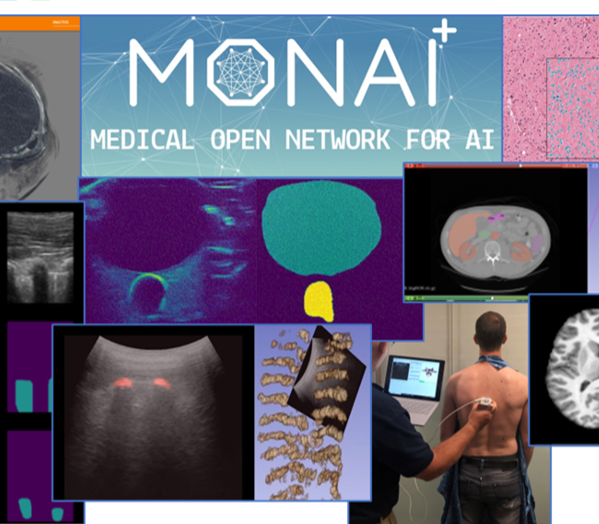Leveraging MONAI for Medical AI

Deep learning technologies have demonstrated the potential to improve nearly every aspect of healthcare. However, significant challenges exist when integrating those technologies into healthcare products and processes. These challenges are particularly critical when regulatory approval is the ultimate goal. The risks and costs associated with failing to address these challenges can hurt small and large businesses alike.
MONAI is an open source platform designed to address the challenges of integrating deep learning into healthcare solutions.
MONAI: Addressing the Challenges of Medical AI
MONAI spans the entire lifecycle of medical AI product development, including AI-assisted data annotation, data and AI model management, algorithms research, federated learning, solution validation, and solution deployment in clinical and research environments.
MONAI prioritizes the unique challenges of healthcare AI: supporting medical standards that facilitate integration into clinical workflows, maintaining the clinical integrity of the results it produces, quantifying performance in terms of clinical needs, emphasizing AI transparency and reproducibility, and utilizing GPUs to provide timely results for clinical decision making.
The success of MONAI in achieving these critical healthcare capabilities has strongly benefited from NVIDIA’s guidance, world-class development expertise, and cutting-edge research collaborations. Kitware can help integrate MONAI and the design and utilization of these NVIDIA resources to achieve the low-latency and scalable compute power needed for any healthcare application.
The Impact of MONAI
King’s College London and NVIDIA are the co-founders of MONAI. Stephen Aylward, Ph.D., senior director of strategic initiatives at Kitware, is the chair of the MONAI advisory board, which includes academic luminaries from across the world. “Kitware has a long-standing relationship with NVIDIA and we are happy to continue working with them to bring MONAI to the medical community,” said Stephen. “As high-quality, open-source software, MONAI will strengthen that community and accelerate the pace of research and development throughout academia and industry.”
As co-founder, NVIDIA has led much of MONAI’s development. While MONAI doesn’t require the use of NVIDIA GPUs, it significantly benefits from the acceleration they provide. For example, automatic mixed precision and TF32 are enabled on NVIDIA A100 Tensor Core GPUs. “NVIDIA is committed to the long-term success of MONAI — from actively nurturing a thriving open-source community to connecting MONAI into many accelerated platforms, including NVIDIA Clara Holoscan,” said Prerna Dogra, senior manager for healthcare AI products at NVIDIA. “MONAI is a game changer for researchers and developers engaged in medical research across the globe.”
Using MONAI: Companion Open Source Platforms
An AI algorithm is never an end-to-end solution. It must be integrated with the appropriate data pre- and post-processing transformations, application-specific user interfaces, intuitive and interactive visualizations, performant data management systems, and existing workflows. These integrations are achieved using other open-source, Kitware-developed platforms, such as the following:
- Insight Toolkit (ITK) for medical image I/O and pre- and post-processing,
- ITKWidgets for interactive 3D data display within jupyter notebooks for AI research,
- Tensorboard3D for exploration of medical AI results and AI experiment optimization,
- Glance for interactive 3D data visualization of AI results in web applications,
- 3D Slicer for AI-assisted annotation of radiological images and custom AI modules,
- Digital Slide Archive for AI-assisted annotation of pathology images,
- Trame for in-browser data visualization paired with server-side AI computations,
- MIQA for AI-assisted medical imaging quality assurance.
This diversity of companion open source software enables the AI algorithms of MONAI to become integral to nearly any existing medical workflow, with minimal installation and maintenance costs.
Partnering with Kitware
Your needs are what drive our passion for creating outstanding software platforms. Deep customer understanding is at the root of everything we do at Kitware, so we operate as an extension of your team and truly get to know your specific challenges and needs. Kitware can apply our domain expertise to help you integrate the power of deep learning into your healthcare medical imaging solutions using the open source MONAI framework. Contact our team for more information.
Thanks for sharing such a great article! Inspiring me to contribute for it!!